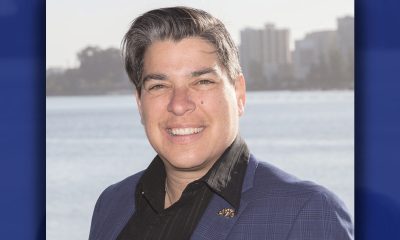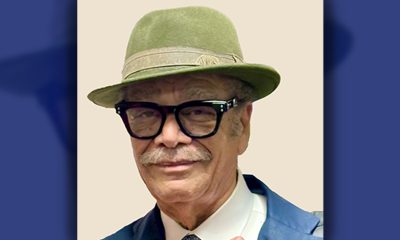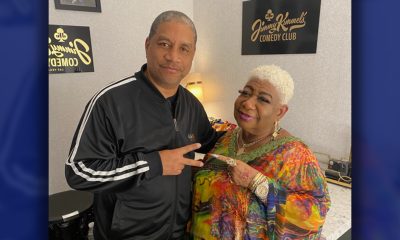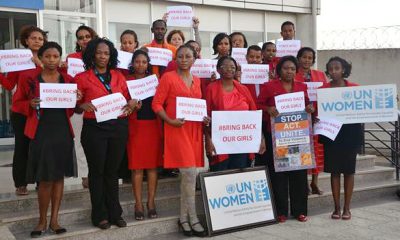World
Scores More Women, Girls Freed in Nigeria from Boko Haram

In this file photo taken Wednesday, April 8, 2015, Nigerian Soldiers man a check point in Gwoza, Nigeria, a town newly liberated from Boko Haram. Nigeria’s military says it is moving 200 girls and 93 women from a northeastern forest where they were rescued from Boko Haram extremists. (AP Photo/Lekan Oyekanmi,File)
Haruna Umar and Michelle Faul, ASSOCIATED PRESS
MAIDUGURI, Nigeria (AP) — Scores more women and children have been rescued from Islamic extremists in the remote Sambisa Forest, Nigeria’s military said amid reports that some of the women fought their rescuers fiercely.
A community leader from the area of northeast Nigeria said Thursday that a senior army officer who was at the scene described the women opening fire on shocked troops in the village of Nbita a week ago, with Boko Haram Islamic insurgents using the women to shield their main fighting force.
He said he was told that 12 women fighters and seven soldiers died in a fierce firefight. The community leader spoke on condition of anonymity because of the sensitivity of the issue and personal security risks.
Some of the women and girls are pregnant, according to Muhammad Gavi, a spokesman for a self-defense group that fights Boko Haram who said some members have seen the females.
The Nigerian military first reported rescuing almost 300 women and children in the Sambisa Forest on Tuesday after deploying ground troops into the forest more than a week ago. The army spokesman, Col. Sani Usman, told The Associated Press on Thursday that more than 100 additional girls and over 50 more women have also been rescued.
He said in a statement that several lives were lost, including that of a soldier and a woman, during shootouts in nine separate extremist camps in the forest.
He said eight women sustained gunshot wounds and four soldiers were seriously injured. It was not clear who shot the women. All the women and children were being evacuated to a safety zone for further processing, Usman said.
It remains unclear if some of the women had willingly joined Boko Haram, or are family members of fighters.
Also killed were several Boko Haram field commanders and foot soldiers. Combat tanks and munitions of high caliber used by Boko Haram were also recovered while others were destroyed, the army spokesman said.
The military was flying in medical and intelligence teams to evaluate the former captives, many of whom were severely traumatized, Usman said earlier.
It is still unclear if any of the schoolgirls kidnapped from the northeastern town of Chibok a year ago were among those rescued.
The plight of the schoolgirls, who have become known as “the Chibok girls,” aroused international outrage and a campaign for their release under the hashtag #BringBackOurGirls. Their kidnapping brought Boko Haram, whose nickname means “Western education is forbidden” in the local Hausa language, to the world’s attention. Of the Chibok girls, 219 remain missing.
Nigerian military and counter-insurgency spokesmen have said they have information indicating at least some of the Chibok girls still are being held in the Sambisa Forest.
Some captives have reportedly become indoctrinated into believing the group’s Islamic extremist ideology, while others established strong emotional attachments to militants they had been forced to marry.
The failure of Nigeria’s government and military to quickly rescue the Chibok girls brought international condemnation.
The military initially appeared incapable of curbing Boko Haram as the insurgents took control of a large swath of northeast Nigeria last year and declared it an Islamic caliphate. That changed when the military received much-needed helicopter gunships and heavy arms and a multinational force launched an offensive at the end of January.
Nigerian President Goodluck Jonathan said Thursday only the Sambisa Forest remains a refuge for the militants.
Jonathan pledged to “hand over a Nigeria completely free of terrorist strongholds,” at a regional meeting of customs officials Thursday.
He lost March 28 elections, in part because of the military failures and a perceived uncaring attitude to the plight of victims of Boko Haram. Former military dictator Muhammadu Buhari becomes president on May 29.
___
Faul reported from Abuja, Nigeria.
Copyright 2015 The Associated Press. All rights reserved. This material may not be published, broadcast, rewritten or redistributed.
###
Activism
South African Solidarity Committee Hosts 31st Annual Celebration
“We’re all together for each other celebrating 31 years of building international solidarity between the people of the United States and South Africa toward the implementation of the 1955 Freedom Charter and 2030 Sustainable Development Goals,” said COSAS Operations Manager Nicole Richards.Located in Berkeley, COSAS is dedicated to the continuing struggle by the people of South Africa’s need for independence.

By Carla Thomas
The Committee of South African Solidarity (COSAS) celebrated its 31st anniversary on Saturday, Oct. 26 at the East Bay Church of Religious Science in Oakland.
Themed “Ubuntu,” a word in Zulu and Xhosa, which means “I am because we are,” the event brought together supporters and community members.
“We’re all together for each other celebrating 31 years of building international solidarity between the people of the United States and South Africa toward the implementation of the 1955 Freedom Charter and 2030 Sustainable Development Goals,” said COSAS Operations Manager Nicole Richards.
Located in Berkeley, COSAS is dedicated to the continuing struggle by the people of South Africa’s need for independence.
A soulful meal was prepared by Chef Rene Johnson and Blackberry Soul Catering along with live entertainment and speakers.
COSAS is an all-volunteer, private membership organization, made up of South Africans, Africans, students, professionals, clergy and others committed to building solidarity between the working people of the U.S. and the South African people still struggling for economic and political freedom.
Formed in 1993, the organization promotes the “real nature” of the changes and struggles taking place in South Africa and the African continent, according to Richards.
“COSAS counters ‘disinformation’ and ‘misinformation’ in the U.S. and Western mainstream media that creates division and distrust,” Richards said. “We produce the South African Beacon and organize and transport solidarity shipments of school supplies to South African grade schools requesting assistance,” Richards said.
According to organizers, COSAS is completely run by volunteers, free from the corporate and government agendas that continue to keep South Africa dependent on the West.
“We rely on the support of concerned individuals. Call us today about how you can get involved by sorting and packing supplies, donating office equipment, and supporting special events,” said Richards.
Earlier in the year, COSAS hosted its World Affairs film showing at Downs Memorial United Methodist Church. The screening featured a short film, “Feeding a Crisis: Africa’s Manufactured Hunger Pandemic,” exploring the hunger challenges African countries face and approaches to resolving the issues.
Contact the Committee for South African Solidarity, 1837 Alcatraz Ave., Berkeley, CA, 510-251-0998 for volunteer opportunities and event information.
Community
How Mobihealth Drives a Telemedicine Revolution in Africa
As a child growing up in northern Nigeria, Dr. Funmi Adewara experienced a severe hand injury that required multiple surgeries and frequent hospital visits. These visits exposed her to the harsh realities of the country’s healthcare system. “I remember sitting in overcrowded waiting rooms, watching doctors stretched thin, unable to meet the needs of so many patients,” Adewara recalls. This formative experience ignited her passion for transforming healthcare in Africa.

By Ifeanyi Abraham
CNN
As a child growing up in northern Nigeria, Dr. Funmi Adewara experienced a severe hand injury that required multiple surgeries and frequent hospital visits.
These visits exposed her to the harsh realities of the country’s healthcare system. “I remember sitting in overcrowded waiting rooms, watching doctors stretched thin, unable to meet the needs of so many patients,” Adewara recalls.
This formative experience ignited her passion for transforming healthcare in Africa.
Growing up with a mother who worked as a nurse, Adewara’s understanding of healthcare challenges deepened through her mother’s stories.
“I knew early on that healthcare wasn’t a privilege — it was a necessity, and I wanted to be part of changing the system,” she explains.
After training as a physician, Adewara worked for 15 years in the United Kingdom’s National Health Service before founding the telemedicine platform Mobihealth in 2017.
Since its launch, Mobihealth has impacted thousands of lives, connecting patients with doctors and healthcare professionals across Nigeria and beyond.
The platform has 20 integrated telehealth clinics that offer remote consultations, diagnostics, and access to specialist care via digital health tools. Located primarily in Nigeria, these clinics are accessible to patients through various subscription plans and are often financed through partnerships with global donor organizations and private donors.
In addition to the clinics, Mobihealth has partnerships with over 200 hospitals, labs, and pharmacies, Adewara says.
The company has earned global recognition, including a $1 million grant from the U.S. Trade and Development Agency in 2022. Adewara was also one of the World Bank’s seven 2020 Sustainable Development Goals & Her award winners, selected from over 2,400 entries worldwide.
Connecting Rural Patients
Across sub-Saharan Africa, millions struggle to access basic healthcare. According to the World Health Organization, the region bears 25% of the global disease burden but has only 3% of the world’s healthcare workers.
“In rural Africa, a trip to the nearest hospital can mean the difference between life and death,” says Adewara.
Mobihealth’s latest initiative offers healthcare for $1 a month for rural and underserved populations. It allows Africans in the diaspora — and global supporters — to sponsor essential services like doctor consultations, diagnostic tests, and access to telemedicine clinics.
The scheme is not solely based on donations; individuals can also subscribe to the service for themselves.
“Healthcare systems across Africa are under immense pressure,” Adewara explains. “Our initiative is a direct response, using technology to connect rural patients with doctors thousands of miles away.”
For Adewara, Mobihealth’s telemedicine platform is not a temporary fix; it represents the future of healthcare in Africa.
“This is about creating a resilient, sustainable and inclusive system, where people, no matter where they are, can access the care they need,” she says.
“Telemedicine brings doctors to people, wherever they may be. By integrating AI and remote monitoring, we are improving the speed and accuracy of care, saving lives in the process,” she adds.
A number of African companies provide telemedicine services, but researchers have pointed out that there are obstacles that could hinder the growth of telemedicine in the continent.
Rural areas can have an unreliable electricity supply and poor internet connectivity, and there is often a lack of government policies and funding around virtual healthcare.
“A Healthcare System for the Future”
Adewara envisions scaling her company’s model to reach millions more across Africa, particularly in countries like Ghana, Kenya, and Ivory Coast.
“Our work is just beginning,” she says. “We are building a healthcare system for the future — one that is resilient, inclusive and capable of meeting Africa’s growing population’s needs.”
However, partnerships are crucial to achieving this vision. “We can’t do this alone. Our collaborations with the African diaspora, hospitals, governments, and international organizations allow us to reach more people and ensure that healthcare is affordable, efficient and accessible,” Adewara adds.
Activism
Atty General Rob Bonta Joins Coalition Backing Pres. Biden’s Migrant Parole Program
“The Biden Administration’s CHNV Parole Program provides a safe pathway to apply for protection for Cuban, Haitian, Nicaraguan, or Venezuelan migrants fleeing violence and upheaval. We urge the court to uphold this program that creates orderly processes for people fleeing humanitarian crises to lawfully reach the United States,” said California Attorney General Rob Bonta. The federal government has exercised its authority under the Immigration and Nationality Act to parole migrants into the country for humanitarian purposes since the Eisenhower Administration.

By Bo Tefu, California Black Media
Attorney General Rob Bonta joined a multistate coalition of 18 attorneys general to write an amicus brief supporting President Joe Bidens’s Parole Program for migrants fleeing violence.
The multistate coalition will submit the brief to the Fifth Circuit Court of Appeals regarding the case Texas v. U.S. Department of Homeland Security. The brief endorses Biden’s Parole Program for Cubans, Haitians, Nicaraguans, and Venezuelans (CHNV Parole Program). The migrant parole program allows individuals from the four countries to apply for advance travel authorization. Migrants can be considered for temporary humanitarian parole of up to two years including employment authorization.
The coalition highlighted California’s interest in maintaining the federal government’s discretionary power granting migrants entry or allowing immigrants to stay on humanitarian grounds.
“In California, we believe that migrants escaping violence should be treated with compassion and dignity, and immigration parole programs are a crucial part of a just and secure immigration system,” said Bonta.
“The Biden Administration’s CHNV Parole Program provides a safe pathway to apply for protection for Cuban, Haitian, Nicaraguan, or Venezuelan migrants fleeing violence and upheaval. We urge the court to uphold this program that creates orderly processes for people fleeing humanitarian crises to lawfully reach the United States,” he said.
The federal government has exercised its authority under the Immigration and Nationality Act to parole migrants into the country for humanitarian purposes since the Eisenhower Administration.
The coalition argued that the lawsuit in Texas threatened to undermine the federal government’s authority to establish crucial programs that help migrants escape unstable circumstances in their home countries.
The coalition stated that parole provides safe, legal, and orderly pathways for people to seek protection in the United States.
However, opponents claim that parole pathways help increase crime and impose costs on states.
-

 Alameda County1 week ago
Alameda County1 week agoAlameda County District Attorney Pamela Price Announces $7.5 Million Settlement Agreement with Walmart
-

 Activism3 weeks ago
Activism3 weeks agoOP-ED: Hydrogen’s Promise a Path to Cleaner Air and Jobs for Oakland
-

 Activism3 weeks ago
Activism3 weeks agoCOMMENTARY: DA Price Has Done Nothing Wrong; Oppose Her Recall
-

 Activism3 weeks ago
Activism3 weeks agoBarbara Lee, Other Leaders, Urge Voters to Say ‘No’ to Recalls of D.A. Pamela Price, Mayor Sheng Thao
-

 Bay Area3 weeks ago
Bay Area3 weeks ago2024 Local Elections: Q&A for Oakland Unified School Candidates, District 3
-

 Community3 weeks ago
Community3 weeks agoTerry T. Backs Oakland Comedy Residency by Oakland’s Luenell at Jimmy Kimmel’s Comedy Club in Las Vegas
-

 Activism3 weeks ago
Activism3 weeks agoOakland Post: Week of October 9 – 15, 2024
-

 Business2 weeks ago
Business2 weeks agoStudy Confirms California’s $20/Hour Fast Food Wage Raises Pay Without Job Losses
























































